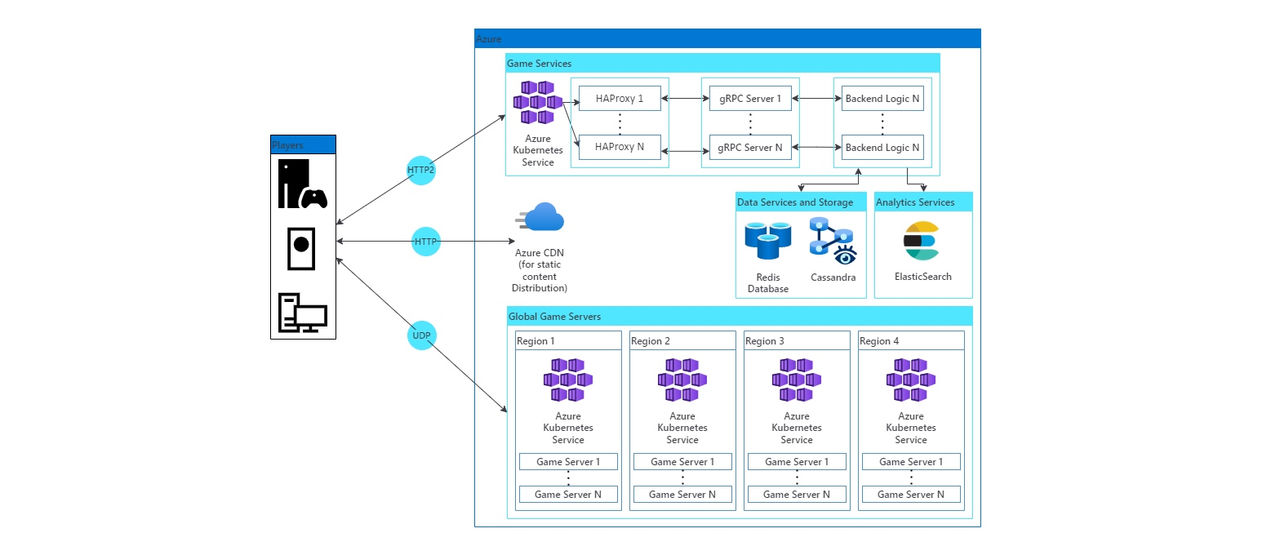Success Story: How Saber Interactive used Azure to scale and launch Evil Dead: The Game
A closer look at how Azure empowered Saber Interactive to bring one of horror's great franchises to players around the world.

When we found out that we’d gotten the rights to make an Evil Dead game, we were ecstatic. With an opportunity to work with Bruce Campbell and the talented cast from the franchise’s films and TV show and a rich IP history to pull from when introducing interesting characters and building unique gameplay elements, we knew that we could make the experience as authentic as possible. As fans of the franchise ourselves, capturing the mood of the demonic presence and the delightfully gruesome violence of the Evil Dead franchise was very important to us.
From the start, we knew that we wanted The Evil Dead: The Game to offer diehard fans and new players alike a great multiplayer experience. This meant that they should be able to play as Ash and his friends from the movies, as well as the infamous Kandarian Demon. Being able to seamlessly jump into games as a Survivor or Demon with online players or with friends was also important, as was having challenging and varied experiences in each match to keep things feeling fresh even after dozens of matches.
Most importantly, we knew that a smooth launch was critical for a multiplayer-only offering. Early in our planning, my team conducted research based on our previous experiences with cloud-based platforms, products, and services, as well as performing tests with recently released technologies. Ultimately, we turned to Azure since it exceeded our expectations, test results and ultimately led us to the conclusion that it was a platform with both the products to meet our needs and capabilities to scale with us, our game, and our player base. Azure ensured that we could allow a large number of players to try their hand at Evil Dead: The Game without dealing with many of the issues that plague many online multiplayer titles on launch day.
So how did we do it?
How Azure Empowered Saber Madrid
We wanted to be ready for a large influx of users, so we built our Azure deployment to be highly scalable, not just in raw capacity but also to be flexible and expandable by region so we could easily meet the demand of our players, wherever they were located. Our systems are distributed with multiple endpoints around the world to allow players to connect to the server closest to them and have the lowest latency, which is possible thanks to the great worldwide coverage of Azure. This was essential to make sure players were having fun with our big launch day for Evil Dead: The Game.
In what turned out to be a pleasant surprise, the game was more successful and had more players on day one than our initial projections and deployment configuration. While we always believed in the game and our ability to get it off the ground and into the hands of players, launching on day one and finding vastly more users than we were initially expecting was a bit scary. Thankfully, blending Kubernetes and Azure offered great scalability, making it very easy to handle and allowing us to quickly scale up and down with no need to make any change to how our servers work and interact with each other. We were also able to plan ahead for this contingency, as we’d used Azure for load testing and had run bots to simulate thousands of players. These tests ended up being extremely helpful in finding issues in our servers even before launching and help lessen stress on the team when we had more players than expected.
Azure Kubernetes Service also offered our team a chance to rethink and refine our server architecture to the solution we ended up using for Evil Dead: The Game. This architecture has proven to be optimal for our online games, providing fast response time when deploying game servers, hot swapping between game server versions, and optimal resource handling.

Using the setup above, we found that using a pure cloud-based architecture gave us incredible scalability at very cost-effective rates. Another very important advantage is the ability to scale up and down very quickly, giving us the ability to serve large player demand for servers as required, then scale back down in quieter moments, all without interrupting the player experience. Cloud computing with Azure gives us the possibility of integrating automatic scalability in an easy and fast way without having to take care of hardware maintenance.
Azure also gives us unified access to a number of services outside of Azure Kubernetes Service, including ElasticSearch and CDN (for deploying balance patches). Structurally, the team has one AKS cluster for each region they have game servers on (four in total), in addition to one cluster for hosting our gaming services and backend logic.
Saber Interactive’s Future with Azure
When Evil Dead: The Game launched this year on Friday the 13th of May, it was an immediate hit. Longtime fans of the franchise loved being able to strap on Ash’s chainsaw to explore the game’s spooky environs, while new players found a multiplayer experience that was beautifully balanced and allowed them to simultaneously scratch both their competitive and cooperative itch.
Looking back, six months after launch, our decision to leverage Azure continues to prove to be a wise one. Like all online games, Evil Dead: The Game requires a focus on balancing gameplay and adding new functionality, all of which is painless between our use of Azure CDN and flexible architecture. But beyond the agility that Azure offers, the platform’s reliability has proven to be an additional bonus for us. Running on Azure has provided us with incredibly stable performance, high uptime and the ongoing benefits of its scalable services and reasonable cost. We could not be happier with how it performs.
Self-sufficiency is very important to us, and it’s the main reason we were drawn to Azure. It was quite intuitive and easy to use at a very competitive price. Although we didn’t begin our development with Azure, taking our previous work and implementing it in Azure was simple, straightforward and a positive experience for the team. We plan to release another game in the future using the same technology—and hosted 100% on Azure. We consider Azure a critical part of our company’s technological ecosystem and would recommend it to any developers looking to better leverage the cloud for their game server hosting.
To learn more about how Azure can help you scale your game servers and services, visit the Azure for Game Development site.
